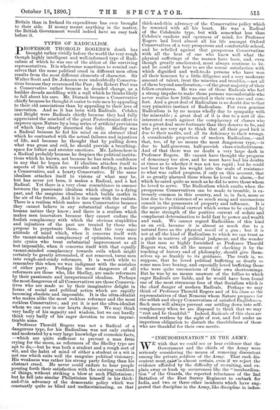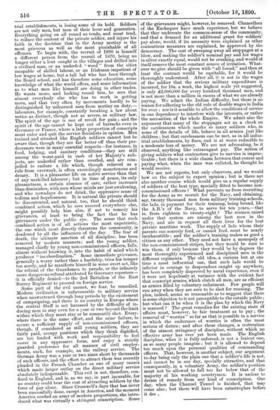"INSUBORDINATION" IN THE ARMY.
WE wish that we could see or hear evidence that the Government and the chiefs of the Army were seriously considering the, means of removing discontent among the rivate °idlers of the Army. That such dis- content must is almost certain, even if we reject the evidence afforded by the difficulty of recruiting, and ex- plain away or hush up occurrences like the " insubordina, tion " of the Guards, the reported reluctance of the 2nd Battalion of the East Surrey Regiment to embark for India, and two or three other incidents which have sug- gested that discipline in the Army, like discipline in indus- trial establishments, is losing some of its hold. Soldiers are not only men, but men of their hour and generation. Everything going on all round us tends, and must tend, to reduce the content of the private soldier, and injure his faith in the doctrine that in the Army mutiny is the most grievous as well as the most punishable of all offences. To begin with, the recruit of 1890 is himself a different person from the recruit of 1870, being no longer either a lout caught in the villages and drilled into a civilised man, or an underfed " weed" from the cities incapable of skilled labour, or an Irishman impatient of low wages at home, but a tall lad who has been through the Board school, and has therefore some education, some knowledge of what the world offers, and some information as to what men like himself are doing in other trades.
He wants more, and looking round him, he sees that almost everybody else who has to work is getting more, and that very often by movements hardly to be distinguished by unlearned men from mutiny on duty,— labourers, for example, constantly breaking a law about notice as distinct, though not as severe, as military law.
The spirit of the age is one of revolt for gain ; and the spirit of the age cannot be kept out of barracks even in Germany or France, where a large proportion of conscripts must enter and quit the service Socialists in opinion. Men trained and situated like English soldiers cannot but be aware that, though they are far better off than their pre- decessors were in many essential respects—for instance, in food, lodging, and sanitary conditions—they are still among the worst-paid in cash of her Majesty's sub- jects, are underfed rather than overfed, and are com- pelled to endure a life which, though relieved as a rule from overwork, is often exceedingly monotonous and dreary. It is a pleasanter life on active service than that of any unskilled labourer ; but in time of peace, its only pleasantness, a certain absence of care, rather increases than diminishes, with men whose minds are just awakening, and who nowadays do not drink, the oppressive sense of tedium and hopelessness. It is natural the private should be discontented, and natural, too, that he should think .combined action, which he sees succeed everywhere else, 'might possibly help him also, if not to remedy his :grievances, at least to bring the fact that he has • ginevances under the public eye. The sense that such 'combined action is of all actions the most unpatriotic, ,the one which most directly threatens the community, is 'deadened by all the influences of the day. The fear of death, the ultimate sanction of all discipline, has been -removed by modern manners ; and the young soldier, managed chiefly by young non-commissioned officers, falls, almost without knowing it, into the habit of mind which ,produces "insubordination." Some immediate grievance, generally a worry rather than a hardship, tries his temper too sorely, and he manifests himself in some overt act, like the refusal of the Guardsmen to parade, or the infinitely more dangerous refusal attributed by Guernsey reporters— it is officially denied—to the 2nd Battalion of the East :Surrey Regiment to proceed on foreign service. .Some part of the evil cannot, we fear, be remedied. Modern civilisation is unfavourable to military service when unsweetened through long periods by the excitement of campaigning, and there is no country in Europe where the central Staff is not harassed by the difficulty of in- ducing men to stay even for a 3ear or two beyond the limit within which they must stay or be summarily shot. Every- where there is the same effort, and the same failure, to secure a sufficient supply of non-commissioned officers, though, if considered as still young soldiers, they are fairly paid, occupy positions which they think dignified, are too loaded with work and responsibility to feel ennui in any oppressive form, and enjoy a strictly guarded preference for all manner of civil employ- ments, such, for example, as the railway service. The German Army was a year or two since short by thousands of such officers, and the effort to attract them was recently pleaded in the French Chamber as one of many causes which made larger outlay on the direct military service absolutely indispensable. This evil is not, therefore, con- fined to England, and is, as we say, in part incurable, for no country could bear the cost of attracting soldiers by the force of pay alone. Since Cromwell's days that has never been successfully done, except in America, and the moment America needed an army of modern proportions, she intro- duced what was virtually a stringent conscription. Some of the grievances might, however, be removed. Chancellors of the Exchequer have much experience, but we believe that they underrate the common-sense of the community, and that a demand for an additional grant for soldiers' pay alone, would, if its necessity were explained as other contentious measures are explained, be approved by the democracy. The cost of sweeping away all stoppages at a blow, and making the soldier's nominal pay and his wages in silver exactly equal, would not be crushing, and would of itself remove the most constant source of irritation. What- ever we give should be given with "all found," and then at least the contract would be equitable, for it would be thoroughly understood. After all, it is not in the wages of the soldier that the serious military expenditure is incurred, for 10s. a week, the highest scale yet suggested, is only £2,600,000 for every hundred thousand men, and is not more than a million in excess of what we are already paying. We admit the Indian difficulty, but there is no reason for adhering to the old rule of double wages in India for ever ; nor is it sensible to allow the conditions of service in one dependency to interfere with the interests, or rather the necessities, of the whole Empire. We admit also the argument that many of the stoppages act as a check on the carelessness which marks so many soldiers who, in some of the details of life, behave in all armies just like children ; but that carelessness can be met, as in all indus- trial establishments, by fines, and is at worst reducible to a moderate loss of money. We are not advocating, be it observed, anything like extravagant pay. The notion of giving soldiers what contractors give to navvies is imprac- ticable; but there is a wide chasm between that course and paying what, when the man was enlisted, he thought he would receive.
We are not experts, but only observers, and we would bow on the subject to expert opinion ; but is there not also another course which would give us a regular supply of soldiers of the best type, specially fitted to become non- commissioned officers ? What prevents us from recruiting for the Army as we recruit for the Navy, and obtaining, say, twenty thousand men from military training-schools, the lads, in payment for their training, being bound, like the A.B.'s of the Navy, to serve for ten years,—that is, from eighteen to twenty-eight ? The seamen raised under that system are among the best men in the Navy, and are in request all their lives for the best private maritime work. The supply of lads whom their parents can scarcely feed, or cannot feed, must be nearly inexhaustible ; and the soldier's training makes as good a citizen as any other. They need not have a monopoly of the non-commissioned stripes, but they would be sure to win them, if only because they would be by degrees the most thoroughly experienced and disciplined men in the different regiments. The old idea, a curious but at one time a most influential one, that such lads would be inferior in courage to desperadoes caught up anywhere, has been completely disproved by naval experience, even if it were not hopelessly at variance with the evident fact that conscript armies, which clutch all men, are as efficient as armies filled by voluntary enlistment. Few people will run away when they are sure to be shot for running. The plan, indeed, seems so reasonable as to suggest that there is some objection to it not perceptible to the outside public ; but what can it be when it is the plan by which the Navy is manned ? The great remedies for the existing state of affairs must, however, be fair treatment as to pay ; the removal of " worries " so far as that is possible in a service in which the endurance of worries is often the most serious of duties ; and after these changes, a restoration of the utmost stringency of discipline, without which no effective army has ever yet been made. The English discipline, when it is fully enforced, is not a lenient one, as so many people imagine ; but it is allowed to depend too much upon the personal qualities of commanding officers. That, however, is another subject, our argument to-day being only the plain one that a soldier's life is not, and cannot be in our day, specially attractive, and that consequently, in a voluntary Army, the soldier's position must not be allowed to fall too far below that of the majority of his working countrymen. It is useless to dream of remedy from any kind of conscription. One day, when the Channel Tunnel is finished, that may - come also ; but there will have been catastrophes before it doe.







































 Previous page
Previous page